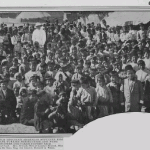Professor Lisa Mazzie Is a Ms. JD Writer-In-Residence
 I am happy to report the news that our Associate Professor of Legal Writing, Lisa A. Mazzie, will be one of Ms. JD‘s writers-in-residence for 2011. Ms. JD describes itself as follows:
I am happy to report the news that our Associate Professor of Legal Writing, Lisa A. Mazzie, will be one of Ms. JD‘s writers-in-residence for 2011. Ms. JD describes itself as follows:
Ms. JD is a nonprofit, nonpartisan organization dedicated to the success of women in law school and the legal profession. Ms. JD is governed by a volunteer Board of Directors comprised of law students and recent graduates and an Executive Director. Founded at Stanford Law School in 2006 by a group of female law students from Boalt Hall (UC Berkeley), Cornell, Georgetown, Harvard, NYU, Stanford, UCLA, UT Austin, the University of Chicago, the University of Michigan, the University of Virginia, and Yale, Ms. JD is a 501(c)(3) incorporated in California.
Serving as a unique nexus between the profession and the pipeline of diverse attorneys, Ms. JD’s online community provides a forum for dialogue and networking among women lawyers and law students. With campus chapters throughout the nation, Ms. JD is also home to the National Women Law Students’ Organization. Ms. JD celebrates women’s achievements, addresses remaining challenges, and facilitates continued progress by bringing legal practitioners and law students together to share in an ongoing conversation about gender issues in law school and the profession.
As a writer-in-residence, Professor Mazzie will post to the blog every month throughout the year. You can read past writer-in-residence posts here.

